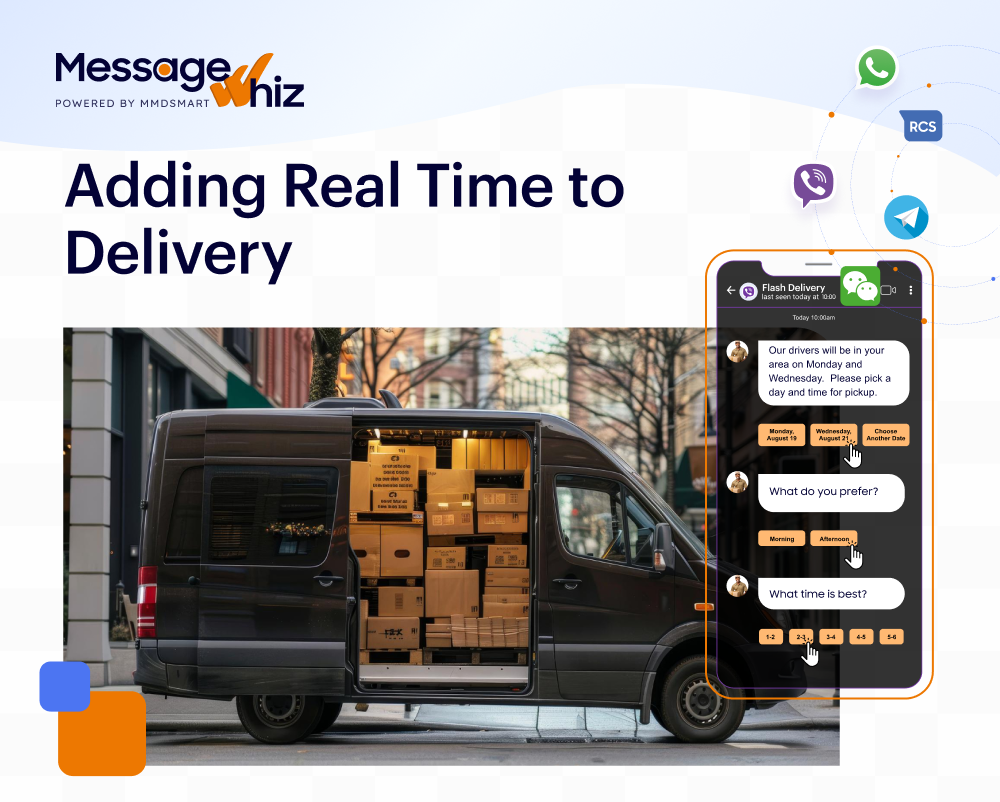Reinventing the Last Mile: AI, Automation, and Seamless Communication
Next-gen last mile logistics is changing. New tech innovations such as drones and autonomous vehicles which will carry packages to their destinations, AI powered routing, and rich dynamic communications across the logistics chain are expected to completely transform logistics and create new last-mile solutions.
These changes will bring cost savings , alleviate environmental concerns, and should lead to a far more efficient last mile delivery process. Logistics of tomorrow will be a combination of automation, data analytics, IoT innovations, for real time tracking, efficient route planning, and better inventory management. Powering it all will be artificial intelligence, while messaging – through RCS or over messaging apps – will facilitate communication between bots, customers, and managers.
Optimize today’s delivery operations. Download our latest ebook, Messaging Mastery: Logistics for all new use cases to solve last mile challenges!
Going Real Time With Messaging
Messaging platforms ensure seamless and instant communication. The real time data shared by an autonomous drone delivering critical supplies to a hospital, can ensure that everything within the hospital is ready when the supplies arrive. Drones can share temperature readings, the condition of the supplies, and most importantly, an accurate time of arrival.
Behind the scenes, AI algorithms analyze data, predict trends, and automate responses. This powerful combination improves the service, while the GenAI created messages let doctors, nurses, and patients prepare in advance..
Last mile logistics are benefiting from the use of AI and messaging, with chatbots and virtual assistants, two of the most prominent GenAI applications in messaging platforms, already answering customer inquiries and managing internal communications. Chatbots are providing 24/7 customer support, as they offer instant responses to common questions about shipment status, delivery times, and order tracking. This reduces the workload on human staff and ensures that customers receive timely and accurate information.
Virtual assistants can also be used internally within logistics companies to streamline operations. For instance, they can assist with scheduling, dispatching, and routing, ensuring that drivers – be they human or machine – receive the most efficient routes based on real-time traffic data. They can also help warehouse managers by tracking inventory levels, generating restock alerts, and coordinating with suppliers. By automating these routine tasks, virtual assistants free up human employees to focus on more complex and strategic activities.
Messaging and AI are poised to introduce new levels of efficiency and intelligence into the supply chain. Today, messaging platforms like MessageWhiz provide 2-way communications channels via SMS, Whatsapp, Viber, RCS and others, facilitating seamless communication, providing real-time updates and enhancing collaboration among all stakeholders. Meanwhile, AI brings predictive capabilities, automation, and advanced problem-solving to logistics operations. Together, these technologies are transforming how goods are transported, managed, and delivered, setting the stage for a more efficient and responsive logistics ecosystem.
Furthermore, AI can predict and prevent issues by analyzing historical data and identifying patterns. For instance, it can forecast demand fluctuations, allowing logistics companies to adjust their inventory levels and staffing accordingly. When integrated with messaging platforms, these insights can be instantly communicated to the relevant teams, ensuring that everyone is aligned and prepared to handle the changes.

Future Trends and Developments
The future of logistics will also be shaped by a convergence of emerging technologies that complement messaging and AI. Key among these are blockchain, the Internet of Things (IoT), and 5G connectivity. Blockchain technology provides unprecedented transparency and security in supply chains, ensuring that every transaction is immutable and traceable. This, combined with AI and messaging, is leading to more trustworthy and efficient logistics operations.
IoT devices, including smart sensors and connected vehicles, will continue to revolutionize logistics by providing real-time data on the location, condition, and status of goods. 5G technology, with its high-speed and low-latency capabilities, will further enhance these systems, enabling instant communication and real-time data processing on a scale previously unimaginable.
Over the next decade, we can expect several transformative changes in the logistics industry. Autonomous vehicles and drones will become more prevalent, reducing the need for human intervention and enabling faster and more efficient deliveries. AI will continue to evolve, offering more sophisticated predictive analytics and automation capabilities that will further streamline operations and reduce costs.
Download Messaging Mastery to start improving your operations through messaging
About MessageWhiz
MessageWhiz is a leading SMS and business messaging service platform powered by MMDSmart, as part of its integrated CPaaS platform. Our platform provides robust solutions for A2P, bulk SMS services, OTP SMS, and smart messaging. Leveraging our unique optimization tools, we enable more efficient, engaging, and profitable interactions across the customer journey.




































